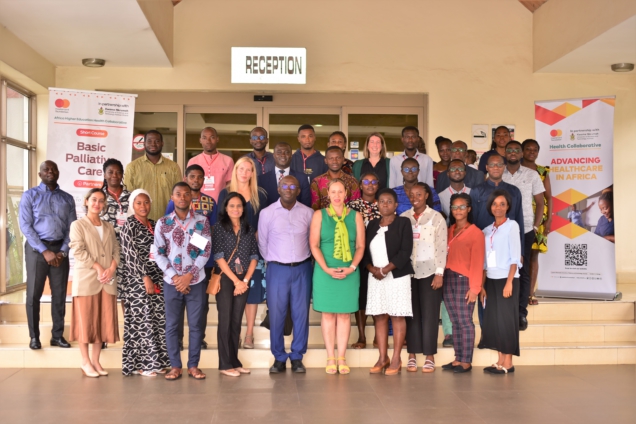In a bid to provide quality healthcare for patients with serious illnesses, such as cancer, the Mastercard Foundation Africa Higher Education Health Collaborative has organised a course in basic palliative healthcare for health personnel.
This course will equip 20 selected health personnel from across the country with the requisite skills to provide specialized medical care for such patients.
The workshop is in partnership with the Kwame Nkrumah University of Science and Technology, University of Toronto and the Ministry of Health.
The programme is under the Health Employment pillar of the Mastercard Foundation Africa Higher Education Health Collaborative.
The Health Employment pillar aims to expand and improve current capacities to train primary healthcare workers.
A facilitator, Prof. Mawuli Gyakobo of the Department of Internal Medicine and Therapeutics, University of Cape Coast, observed some shortfalls in palliative care in the country.
“We also observed some of the misapplication of some opioid drugs across the country, and this was quite disturbing and so we thought that there was a huge gap to be filled if we had to give quality care to our patients across the country.
“The gap is still wide and we have not been able to fill out many of them, “ he said.
Dr. Jennifer Wilson of the Department of Family and Community Medicine at the University of Toronto was optimistic of the positive impact of the training.
“I know that this training is going to be something that is going to impact you, inspire you, equip you so that you can return to help your people,” she said.
The Dean of the KNUST School of Public Health, Prof. Samuel Newton commended the Mastercard Foundation Africa Higher Education Health Collaborative for the initiative.
“We are really grateful, Mastercard has made a big difference in the school of public health and we hope that in these few days we can still do better by learning from the others who have joined us,” he said.
The Africa Higher Education Health Collaborative in partnership with the Mastercard Foundation seeks to advance healthcare in Africa through three pillars: Health Employment, Health Entrepreneurship and Health Ecosystem.
The Health Entrepreneurship pillar aims to develop an entrepreneurial mindset and culture that supports entrepreneurs to create meaningful innovations and employment opportunities in the health sector.
The Health Ecosystem pillar also aims to train and prepare a new generation of talented professionals with the broad sets of skills required to drive equitable and inclusive growth.
Latest Stories
-
NAPO commissions library to honour Atta-Mills’ memory
5 mins -
OmniBSIC Bank champions health and wellness with thriving community walk
6 mins -
Kora Wearables unveils Neo: The Ultimate Smartwatch for Ghana’s tech-savvy and health-conscious users
10 mins -
NDC supports Dampare’s ‘no guns at polling stations’ directive
13 mins -
Police officer interdicted after video of assault goes viral
31 mins -
KNUST’s Prof. Reginald Annan named first African recipient of World Cancer Research Fund
32 mins -
George Twum-Barimah-Adu pledges inclusive cabinet with Minority and Majority leaders
1 hour -
Labourer jailed 5 years for inflicting cutlass wounds on businessman
1 hour -
Parliament urged to fast-track passage of Road Traffic Amendment Bill
1 hour -
Mr Daniel Kofi Asante aka Electrician
1 hour -
Minerals Commission, Solidaridad unveils forum to tackle child labour in mining sector
1 hour -
Election 2024: Engagement with security services productive – NDC
1 hour -
Retain NPP for the good of Ghana – Rebecca Akufo-Addo
1 hour -
‘Let’s work together to improve sanitation, promote health outcome’ – Sector Minister urges
1 hour -
Ellembelle MP cuts sod for six-unit classroom block at Nkroful Agric SHS
2 hours

